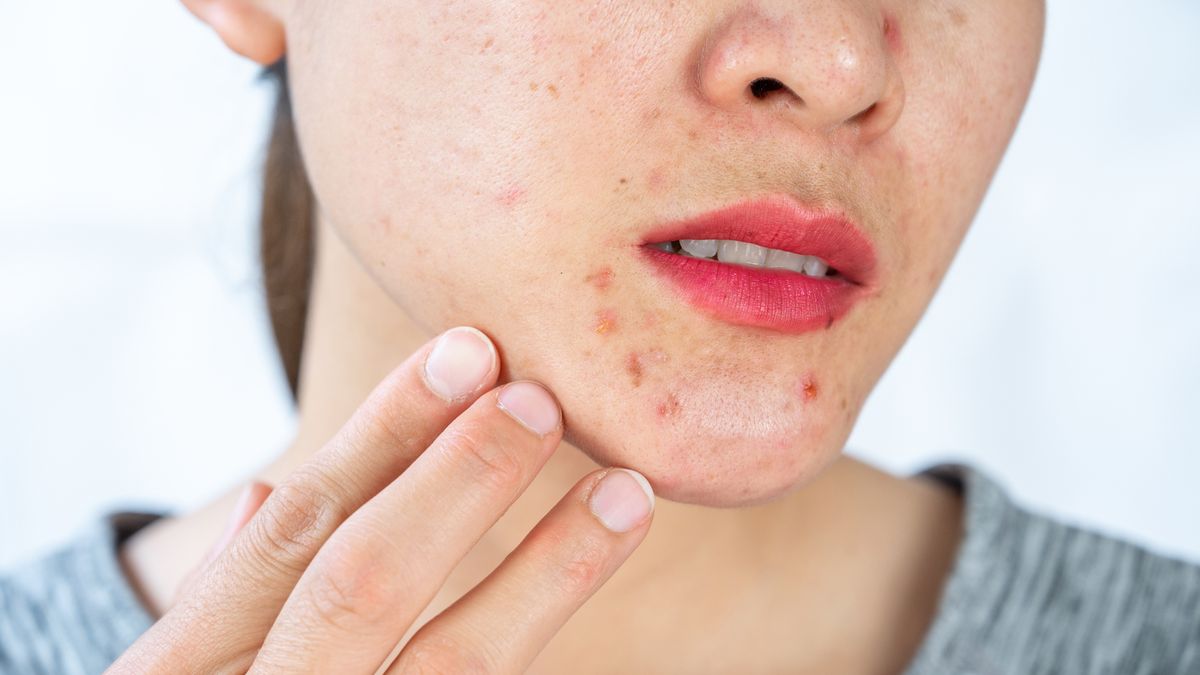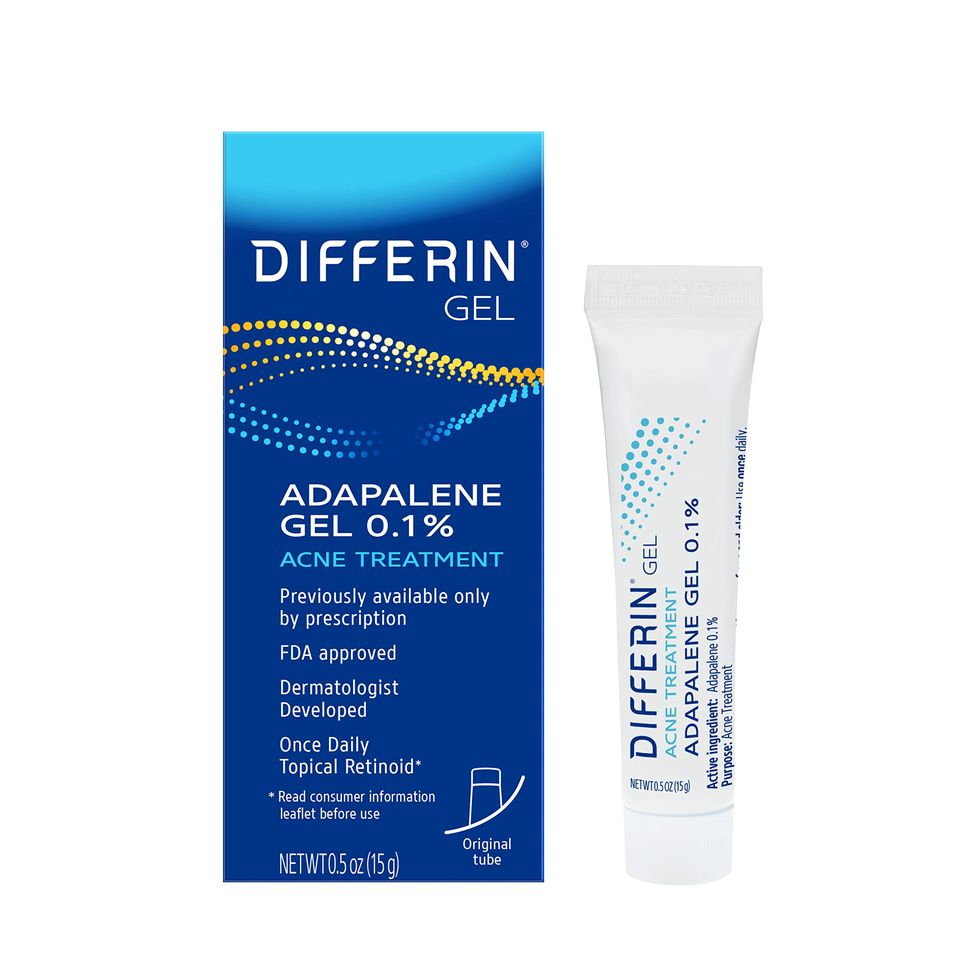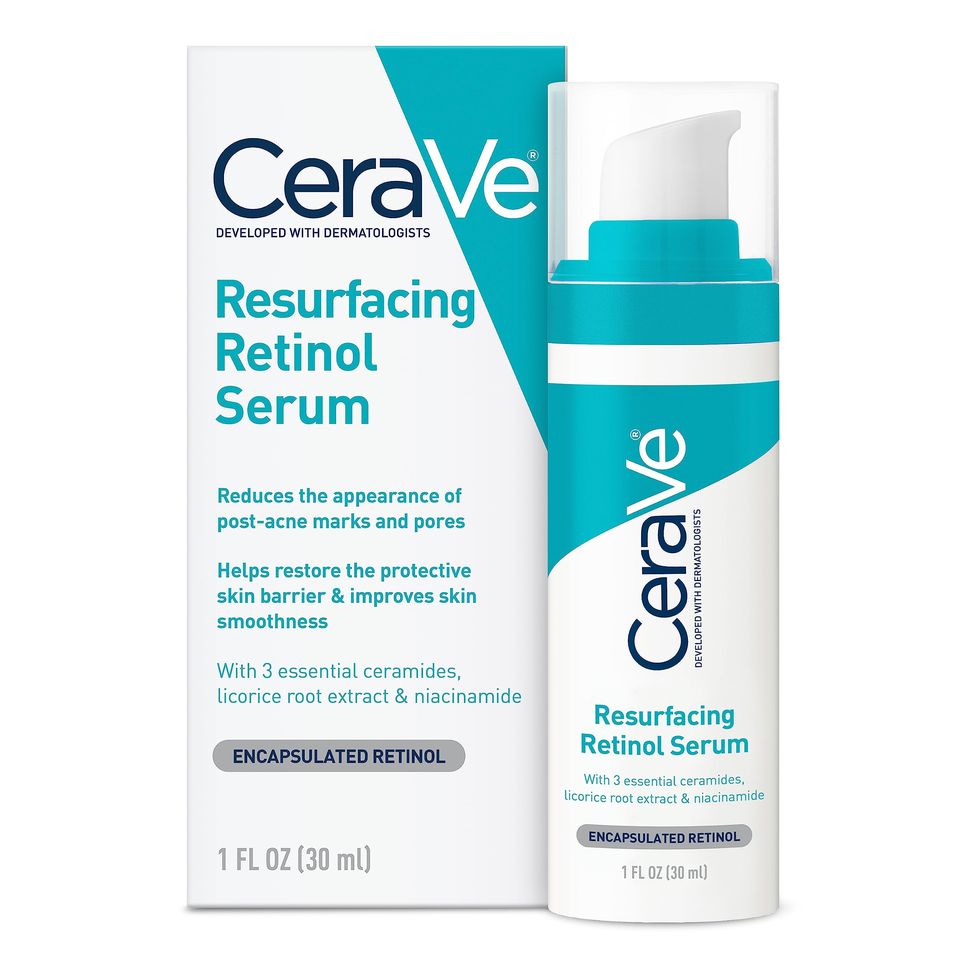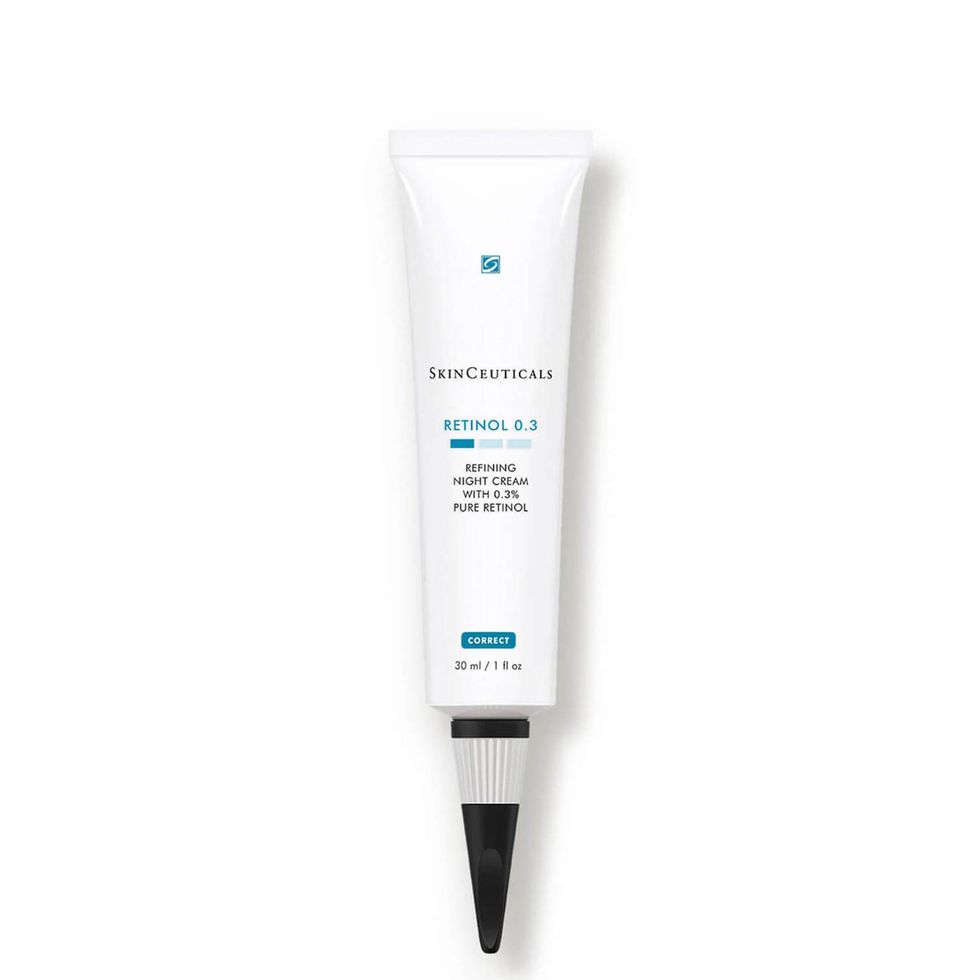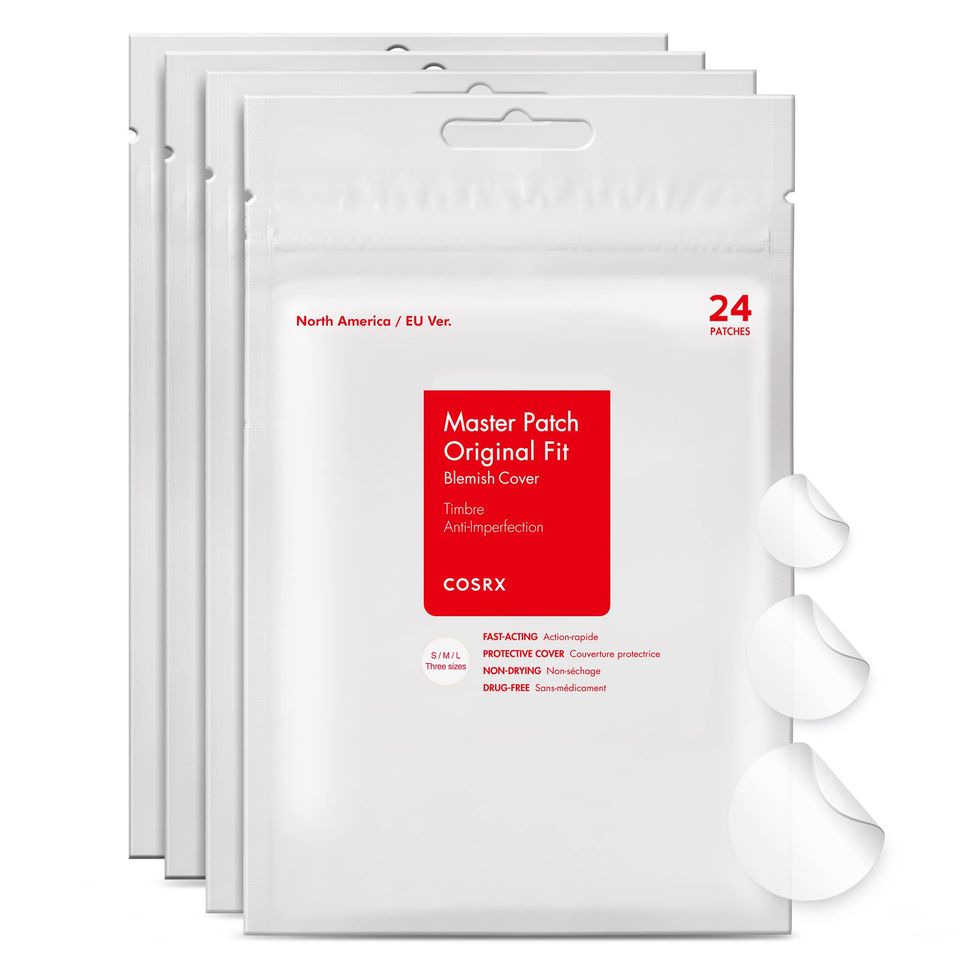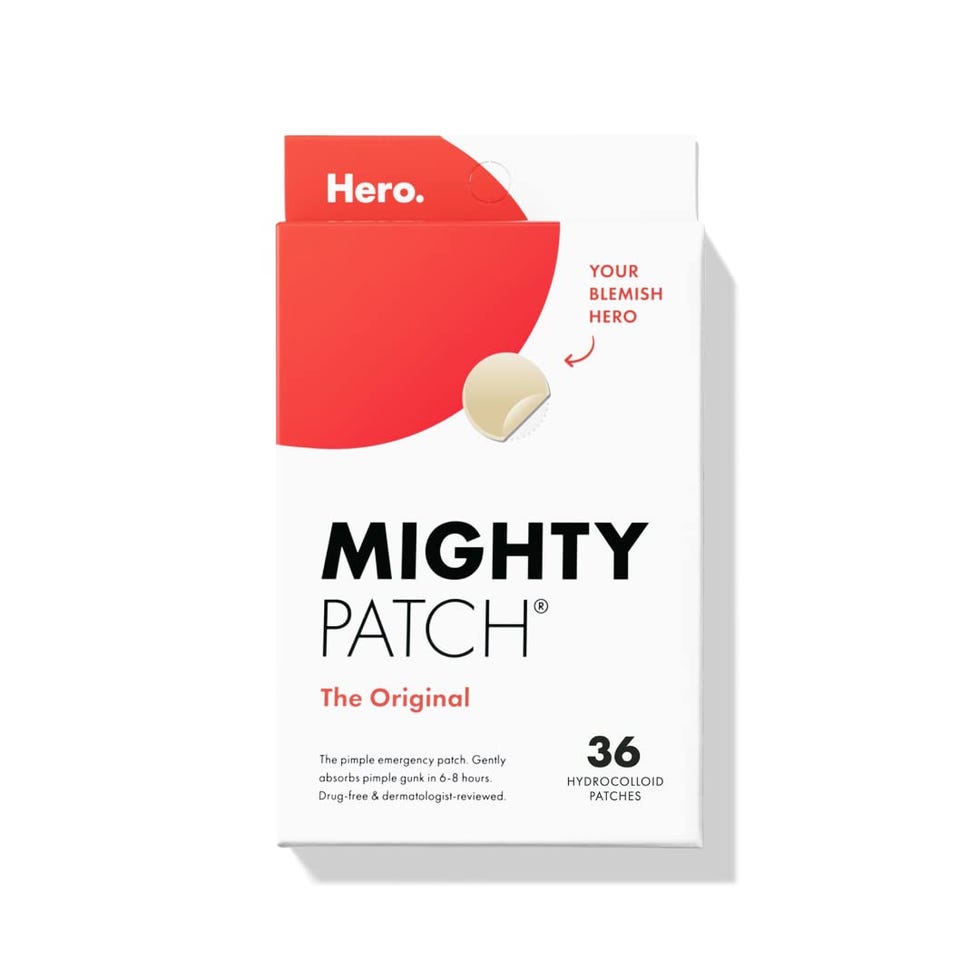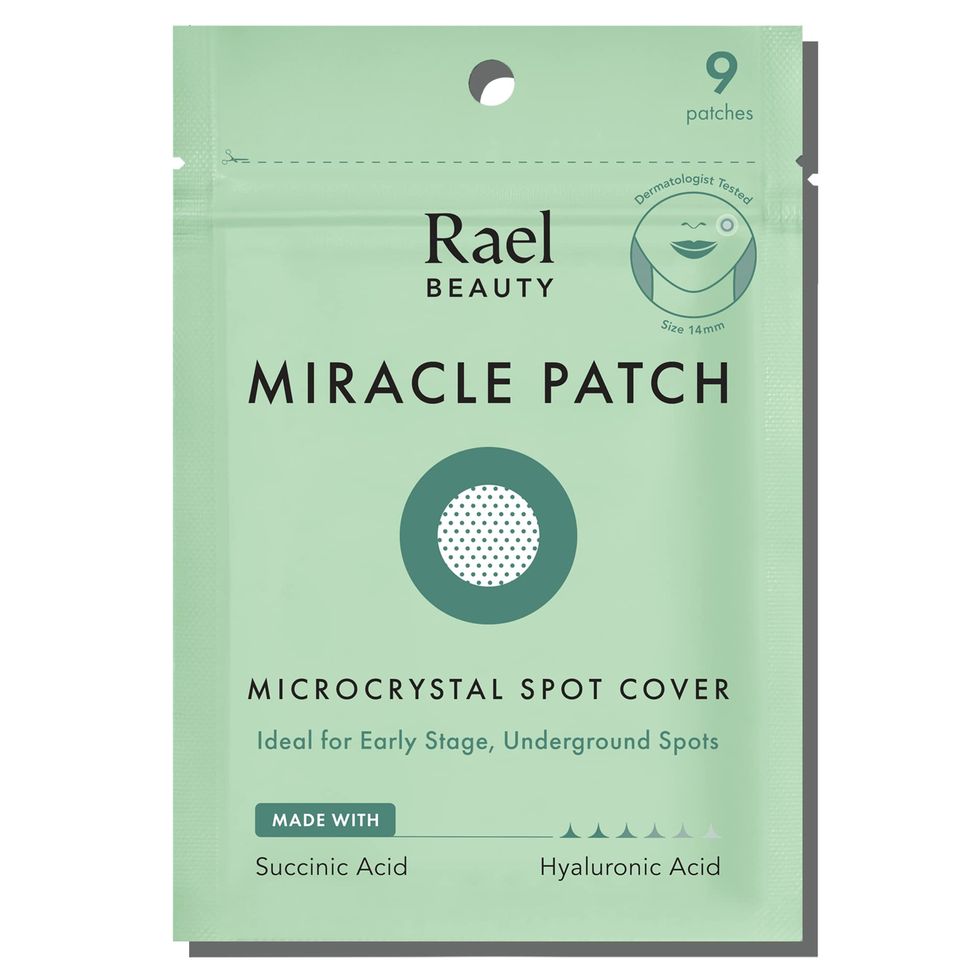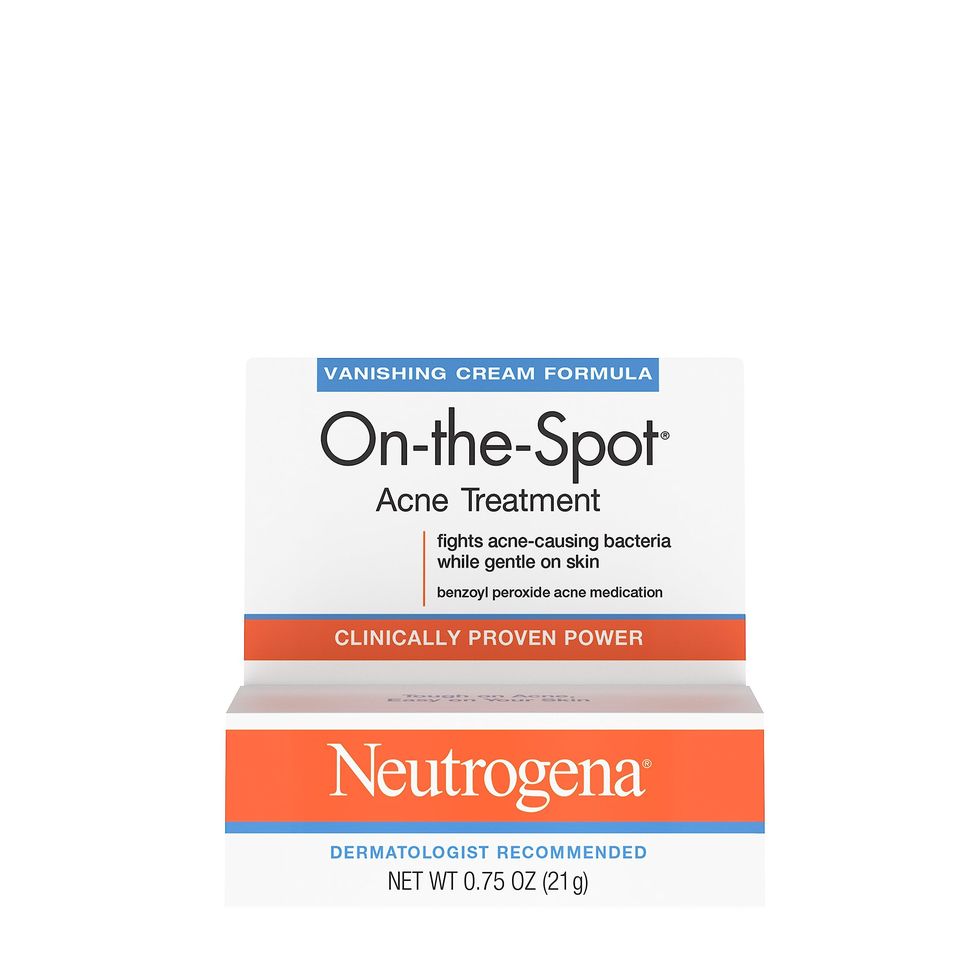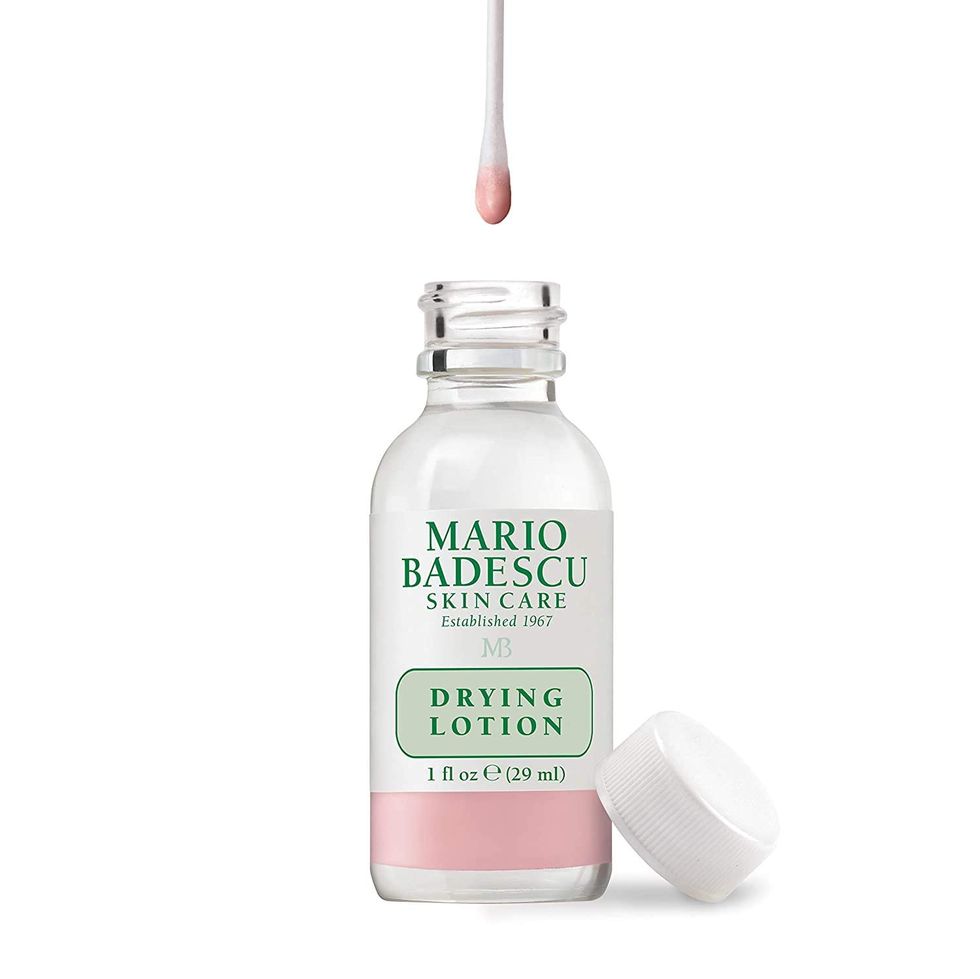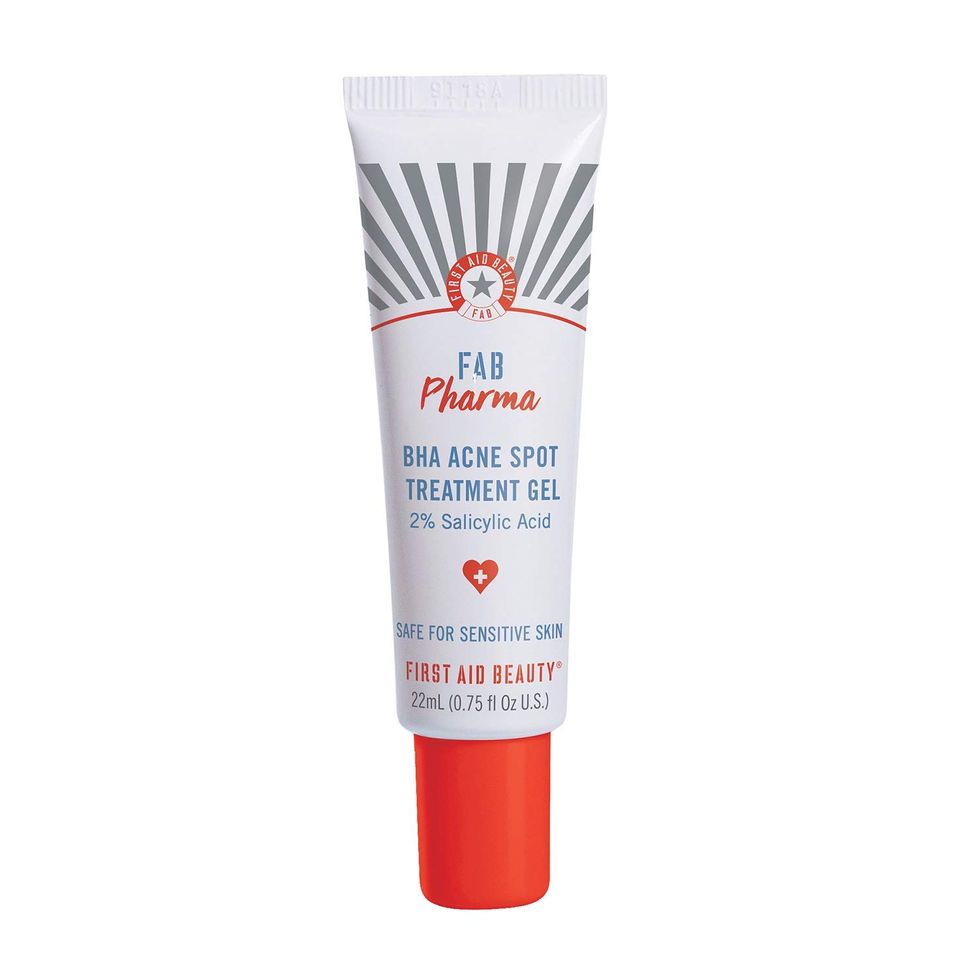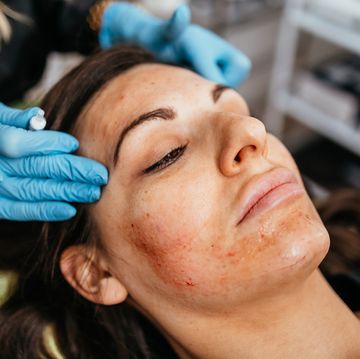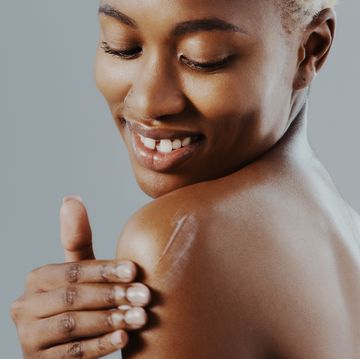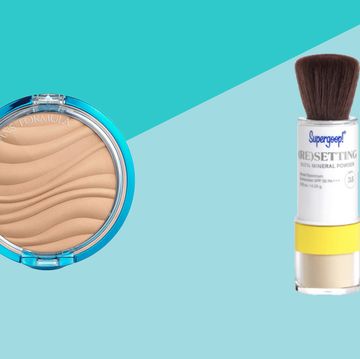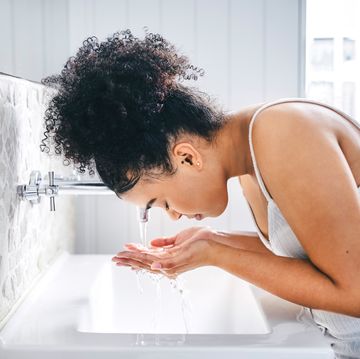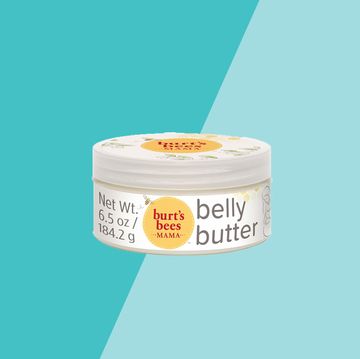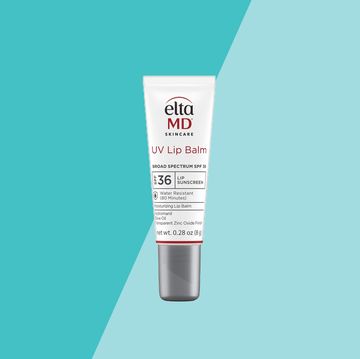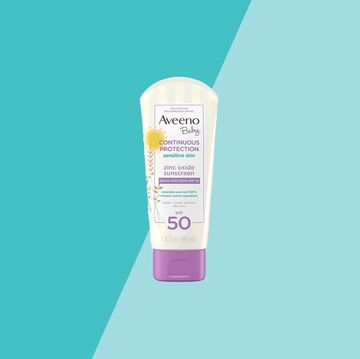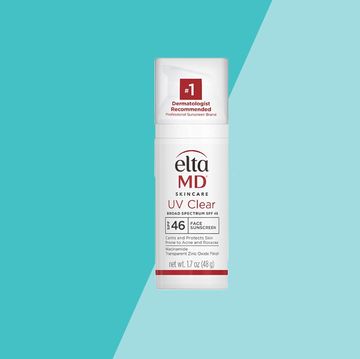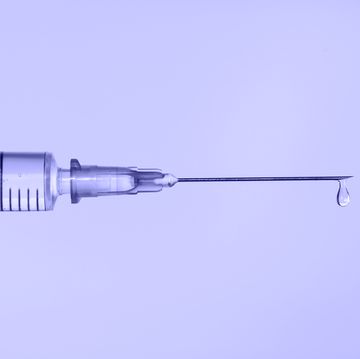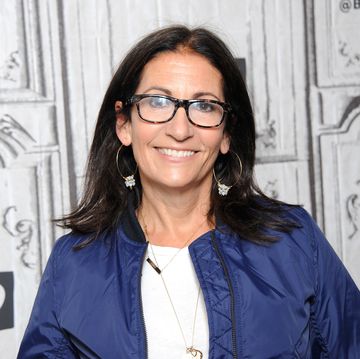Chin acne is often uncomfortable, hard to cover, and difficult to treat. Many adult acne sufferers experience these types of breakouts—and while it might be helpful to know you’re not alone, you’re likely wondering how to get rid of chin acne and banish those pesky pimples once and for all.
But why do we experience chin acne, anyway? “Similar to other acne, chin acne may be caused by a combination of factors including increased sebum production, clogged pores, inflammation, and bacteria,” says Marisa Garshick, M.D., F.A.A.D., a board-certified dermatologist in New York. “In some individuals, there may also be a hormonal component that can contribute to acne as well.”
Meet the experts: Marisa Garshick, M.D., F.A.A.D., a board-certified dermatologist in New York; and Heather Richmond, M.D., F.A.A.D., a board-certified medical and cosmetic dermatologist in Texas.
Ahead, find out how to get rid of chin acne, what might be causing chin acne, and find the best acne products and acne treatment recommendations. You’ll be on your way to clearer skin in no time.
What causes chin acne?
Like other forms of acne all over your face and body, there are multiple reasons your chin may break out. Here are some common reasons you’re finding pimples on your chin:
Hormonal chin acne
You’d think that hormonal acne would stop once you’re through puberty, but hormonal chin acne is most often seen in women older than 25 years old through menopause, explains Heather Rogers, M.D., F.A.A.D, a board-certified dermatologist in Washington. She says that these pimples often develop the week leading up to your menstrual cycle, and are due to mild elevations in testosterone levels.
Dr. Garshick adds that they’ll usually appear on the bottom third of your face on the chin and jawline. The bumps are characterized by extremely tender and deep redness, making them incredibly difficult to pop or get rid of, Dr. Rogers says.
Fungal acne
If you’re dealing with tiny, red bumps on your chin area, you might not be dealing with typical acne. It could be a case of fungal acne, which is caused by yeast instead of bacteria. It’s often called pityrosporum folliculitis or malassezia folliculitis, and is essentially “inflammation of the hair follicle caused by an overgrowth of yeast on the skin,” Dr. Zeichner previously explained of fungal acne.
If you aren’t experiencing blackheads and whiteheads, and instead see small, red bumps—you might be dealing with fungal acne. You’re more likely to develop this kind of breakout if you are sweating a lot or have recently taken a course of antibiotics.
Maskne
At the height of the Coronavirus pandemic, many dermatologists saw an increase in patients suffering from acne in places covered by face masks, like the chin area. Dr. Rogers explains that this is due to a change in your skin biome caused by your breath being trapped under the mask, which creates a moist environment and introduces new organisms.
Alternatively, Dr. Garshick adds that you could also be suffering from acne mechanica. “This is a type of acne in that repeated friction and mechanical obstruction of the hair follicle can lead to clogged pores and breakouts, which is similar to what occurs with a helmet or chin strap,” she explains.
These are characterized as much more surface-level pimples like blotchy red bumps, whiteheads, and irritation around the mouth and nose, Dr. Rogers says.
How to get rid of chin acne fast
We’ve all seen the pimple-popping videos that circulate on the internet, but when it comes to an at-home remedy to quickly zap chin pimples, doing it yourself may not be the best answer. “While it may be tempting, it is important to avoid picking, popping, or squeezing your breakout as that can trigger more inflammation and lead to potential scarring,” Dr. Garshick warns.
Instead, try one of these expert-approved quick fixes:
Retinol
Dr. Rogers says using retinol regularly for hormonal acne can help with skin turnover, getting the deep acne to surface and disappear. Not only will retinol help resolve your chin acne faster, but it can actually make the dark spots and shadows disappear quicker, too. She suggests starting with 0.25% for dry skin and 0.5% for oily or less sensitive skin. Anything higher will be super drying.
“Retinols are extremely beneficial to unclog pores and prevent acne, and they can be found in many over-the-counter formulations,” Dr. Richmond says. She notes that retinol can also be sold under the name adapalene.
Hydrocolloid patches
When you feel a pimple under the skin, hydrocolloid patches can help bring hormonal acne to the surface faster, ultimately resolving them quicker, Dr. Rogers says.
Dr. Garshick likes the COSRX Acne Pimple Patch because it acts as a protective barrier and helps draw out oil and reduce breakouts. “This is especially great for someone who has a tendency to pick at breakouts as it can help to create a barrier to prevent squeezing or picking,” she says.
Probiotics
For acne caused by mask-wearing, Dr. Rogers says a great oral probiotic aimed at skin health can help balance the skin biome. She suggests eating fermented foods like yogurt and kimchi to help repopulate the bacteria of the skin or trying skin-focused probiotic supplements like Hum Skin Squad. “Even taking that a couple of days can help normalize the skin,” she says. “Three or four days using a skin probiotic takes care of it.”
Spot treatments
For some pimples, a good spot treatment can do the trick to nix your breakout for good. Dr. Garshick suggests picking a benzoyl peroxide treatment or ingredients like salicylic acid to remove breakouts quickly. She loves Neutragena On-The-Spot Acne Spot Treatment for a benzoyl peroxide product or First Aid Beauty FAB Pharma Acne Spot Treatment for a salicylic acid spot treatment.
“But it is important to note that for deep or cystic breakouts, spot treatments may not be sufficient to make the spot go away and may just lead to excess irritation,” she warns.
Tea tree oil
For those looking for a natural remedy for acne, Dr. Garshick says tea tree oil can be helpful in reducing inflammation and bacteria. She likes the St. Ives Acne Control Face Cleanser with Tea Tree, which also includes salicylic acid to treat acne.
“But in general, it is always best to speak with a dermatologist regarding your treatment options as some natural ingredients can still be irritating or lead to redness or sensitivity of the skin,” Dr. Garshick notes.
LED therapy
If you’re not looking to add any additional topical products to your skincare routine, try opting for light therapy instead. An LED face mask can help reduce the acne-causing bacteria on the skin, in turn helping to treat and prevent breakouts.
These LED masks often have a few different colored-light options to help treat different skin concerns, but if you’re looking to treat acne, you’ll want to turn yours to the blue setting. “Blue light is thought to have antimicrobial effects and is often used with red light to treat acne,” Joshua Zeichner, M.D., director of cosmetic and clinical research in dermatology at Mount Sinai Hospital in New York City previously explained.
In-office treatment
If your home quick fixes don’t seem to work, take a visit to the dermatologist to determine the best treatment for your acne. Dr. Rogers says that your dermatologist may offer a steroid injection or oral antibiotic to settle the inflammation and resolve some of the tenderness of the larger pimples. If the breakouts are frequent and cause serious discomfort, there are prescription medications that offer faster clear-ups, like retinoids, topical antibiotics, and benzoyl peroxide, she adds.
However, when it comes to hormonal acne, the approach may look a little different. Dr. Rogers notes that hormonal chin acne will last about a week leading up to your menstrual cycle, but as you age these breakouts may pop up throughout the month. And unfortunately, these deep pimples aren’t easy to nix.
“Hormonal acne is hard to treat with topicals because they’re such deep pimples,” Dr. Rogers says. She advises chatting with your dermatologist about treatment options. She typically recommends patients take a very low dose of spironolactone, an oral medication that can inhibit your body from converting estrogen into testosterone, which causes hormonal pimples.
“Prescription management is primarily used to treat hormonal acne,” adds Dr. Richmond. Your doctor can work with you to determine if an oral contraceptive, contraceptive patch, or vaginal ring may be helpful to your acne. Additionally, Dr. Richmond says your doc can prescribe benzoyl peroxide with topical antibiotics to be used as a spot treatment.
How to prevent chin acne
The number one thing you can do for your skin health is to wash your face every night, Dr. Rogers says. She adds that if you’re struggling with chin acne, you really don’t need to do much to help your skin barrier get back to normal. A good wash and moisturizer once a day should do the trick. Try one of these best face washes for acne-prone skin.
And if you choose to use additional products, Dr. Garshick notes that you should avoid any pore-clogging cosmetics and skincare. Instead, opt for non-comedogenic and oil-free products.
Will chin acne go away without treatment?
While chin acne may go away on its own, it’s more likely that you will need some kind of at-home or in-office treatment to not only heal existing breakouts but reduce future breakouts too. This is especially true for hormonal chin acne, which Dr. Rogers says is often more difficult to treat and requires a more tailored approach.
When to see your doctor
If you try the above treatment methods with little success, it might be time to schedule a visit with your dermatologist. “For any patient struggling with acne, I suggest seeing a dermatologist to discuss options and to begin a treatment regimen,” Dr. Richmond explains. “There is no one-size-fits-all approach, and treatments are tailored to the individual patient over time to find an effective combination.”
..

Arielle Weg is the associate editor at Prevention and loves to share her favorite wellness and nutrition obsessions. She previously managed content at The Vitamin Shoppe, and her work has also appeared in Women’s Health, Men’s Health, Cooking Light, MyRecipes, and more. You can usually find her taking an online workout class or making a mess in the kitchen, creating something delicious she found in her cookbook collection or saved on Instagram.

Shannen Zitz is an Assistant Editor at Prevention, where she covers all things lifestyle, wellness, beauty, and relationships. Previously the Editorial Assistant at Prevention, she graduated from the State University of New York at Cortland with a bachelor's degree in English. If she’s not reading or writing, you can probably find her frequenting the skincare and makeup forums on Reddit or hogging the squat rack at the gym.
Karan Lal, D.O., F.A.A.D., is a native New Yorker now living in Scottsdale, Arizona. He practices in both Scottsdale and New York. Dr. Lal is the only double fellowship trained pediatric and cosmetic dermatologist in the USA. He is a key opinion leader and international speaker with interests including social media medicine, LGBTQ health, eczema, psoriasis, vitiligo, laser surgery, melasma, and soft tissue augmentation. He is the chair of the social media committee for the Society of Pediatric dermatology and is on the ASDS DEI committee. Dr. Lal is often seen either on the news, at F45, or playing with his parrot Maui.
